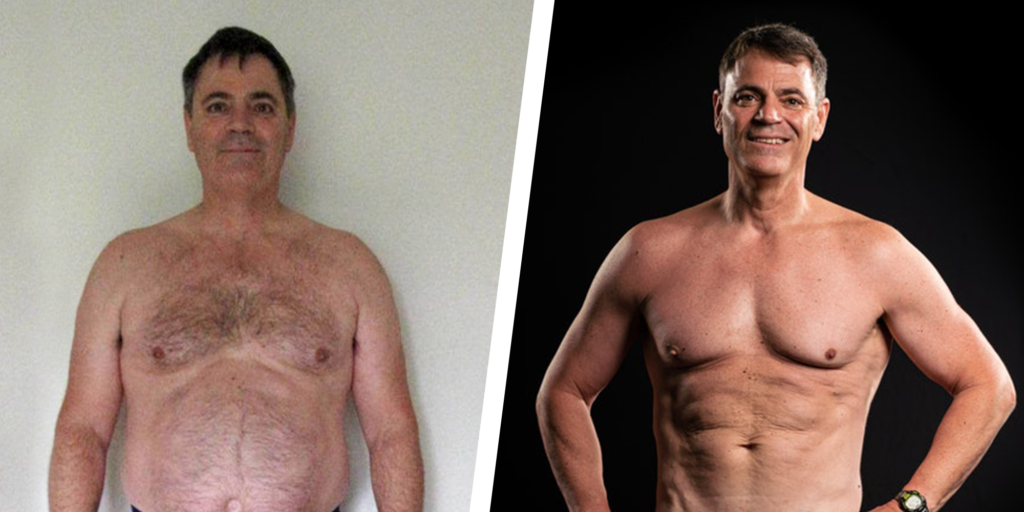Introduction
If you feel like losing weight has become harder than ever after 50, you’re not alone. Many men eat the same way they always have, only to find their waistline expanding. The culprit? Slowing metabolism, hormonal changes, and lifestyle shifts.
The good news is that with a few strategic changes, you can reignite fat loss, boost energy, and take control of your health again—without crash diets or extreme exercise.
Why Losing Weight After 50 Feels Impossible
1. Your Metabolism Slows Down
As men age, they burn 200-500 fewer calories per day due to a decline in metabolic rate. (Mayo Clinic, 2023) Muscle mass plays a crucial role in metabolism, and since muscle loss accelerates after 50, calorie-burning potential decreases.
2. Testosterone Decline Leads to Fat Gain
Testosterone levels drop by about 1% per year after 30, and lower testosterone is linked to higher body fat, reduced muscle mass, and increased belly fat. (NHS, 2022) Since testosterone is essential for metabolism, lower levels make it easier to store fat.
3. Insulin Resistance Increases
With age, the body becomes less efficient at processing carbohydrates, leading to insulin resistance. This means more of the food you eat gets stored as fat instead of being used for energy. (National Institutes of Health, 2021)
4. Poor Sleep Disrupts Fat Loss
Men over 50 who get less than 6 hours of sleep per night have higher cortisol (stress hormone) levels, which promotes fat storage—especially around the belly. (Journal of Clinical Endocrinology & Metabolism, 2020)
5. Muscle Loss Reduces Calorie Burning
Without regular strength training, muscle mass declines by 3-8% per decade after 30, leading to a lower resting metabolism. (Harvard Health, 2022) This means you burn fewer calories even when you’re not working out.
How to Fix It: A Smarter Approach to Weight Loss After 50
1. Prioritize Strength Training
Lifting weights isn’t just for bodybuilders—it’s essential for men over 50. Strength training helps maintain muscle, boost metabolism, and keep testosterone levels stable. Aim for 2-3 strength workouts per week, focusing on compound movements like squats, deadlifts, and push-ups.
2. Increase Protein Intake
Protein is the most important macronutrient for men over 50 trying to lose weight. It helps preserve muscle mass and keeps you full longer.
- Aim for 0.7-1.0g of protein per pound of body weight per day.
- Good sources: Lean meats, eggs, Greek yogurt, fish, and plant-based proteins like lentils and beans.
3. Reduce Processed Carbs and Focus on Timing
Because insulin sensitivity declines with age, processed carbs (white bread, pasta, sugar) should be limited to post-workout meals, when your body can use them most efficiently.
- Swap out processed carbs for fiber-rich foods like vegetables, berries, and whole grains to keep blood sugar stable.
4. Get Quality Sleep to Boost Fat Loss
Aiming for 7-9 hours of sleep per night is crucial for testosterone production and appetite control.
- Avoid screens an hour before bed.
- Keep your bedroom cool and dark.
- Stick to a consistent sleep schedule, even on weekends.
5. Manage Stress to Lower Cortisol
Chronic stress raises cortisol levels, leading to increased belly fat storage and sugar cravings.
- Try meditation, deep breathing, or yoga for relaxation.
- Get outside—sunlight helps regulate sleep and mood.
- Engage in hobbies and activities that help you unwind.
6. Hydrate and Support Digestion
Drinking water is one of the easiest ways to improve metabolism and reduce cravings.
- Aim for at least 8-10 glasses of water per day.
- Add fiber-rich foods like vegetables and flaxseeds to support digestion and gut health.
Final Thoughts
Losing weight after 50 requires a different approach than when you were younger. Instead of focusing on extreme diets or excessive cardio, prioritize strength training, eat more protein, optimize sleep, and manage stress to create sustainable, long-term fat loss.
With the right strategy, you can boost energy, build muscle, and maintain a lean, strong body well into your later years.
Citations:
- Mayo Clinic. (2023). How Aging Affects Your Metabolism.
- National Health Service (NHS). (2022). Testosterone and Weight Gain in Men Over 50.
- National Institutes of Health (NIH). (2021). Insulin Resistance and Aging.
- Journal of Clinical Endocrinology & Metabolism. (2020). The Impact of Sleep on Metabolism.
- Harvard Health Publishing. (2022). Strength Training and Muscle Preservation.


